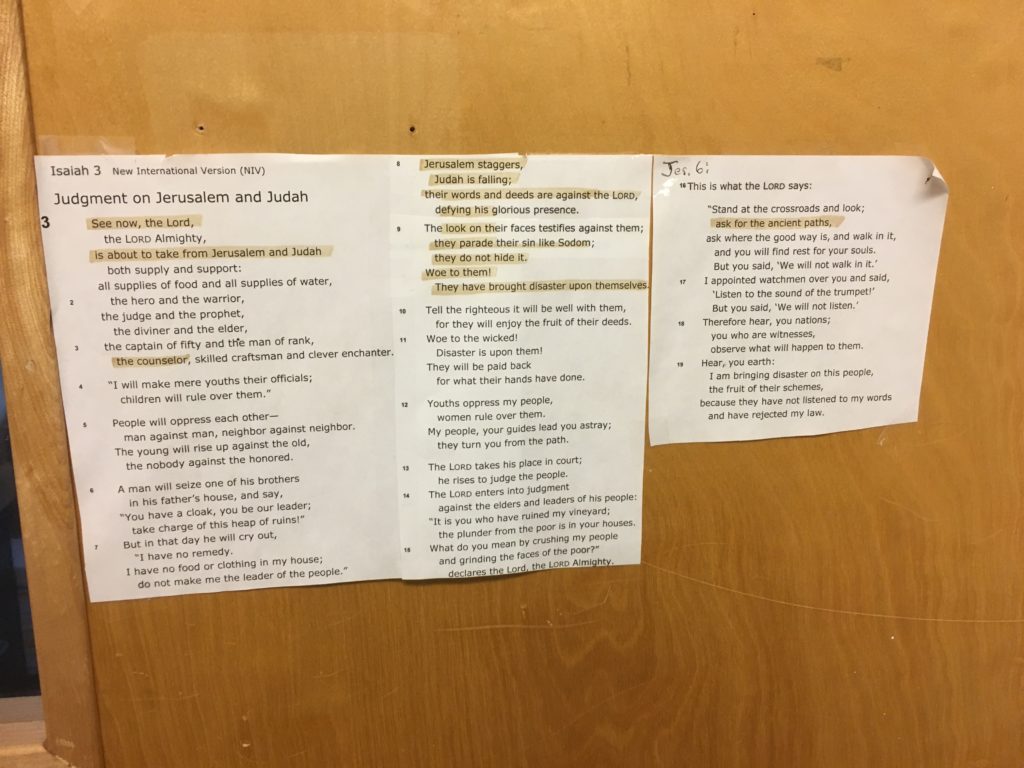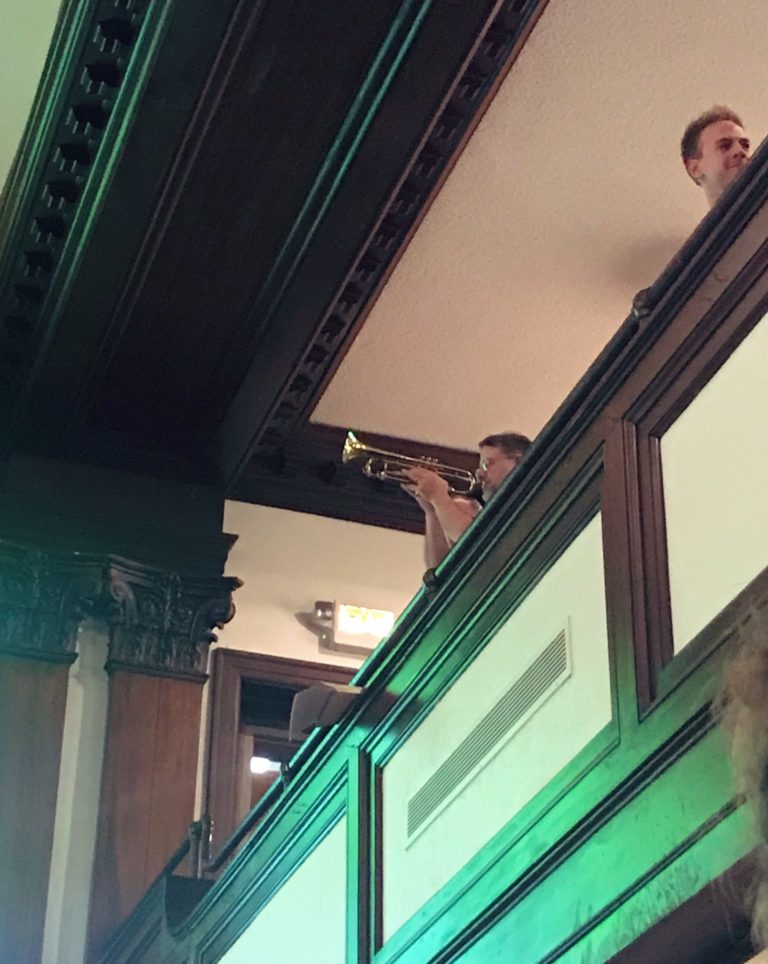Fiona Morgan, News Editor
Dr. Martin Seitz, associate professor of psychology at Asbury, has been placed on administrative leave by the university.
After listening to Asbury’s new provost, Dr. Timothy Wooster, speak about the Imago Dei (Image of God) initiative in chapel March 6, Seitz sent an email to all students, faculty, staff and administration, taking issue with Wooster’s message.
Seitz also made a public display during chapel Monday, March 11. Toward the end of the service, students noticed Seitz sitting in the balcony of Hughes Auditorium holding a trumpet to his lips but never making a sound. He held it up through the duration of the final worship song and then hastily exited, spilling papers over the balcony down to where Gray and Wooster were standing below. The content of the papers Seitz dropped is unconfirmed, and his administrative leave was announced the following day.
On March 12, Asbury administration announced that Seitz was placed on administrative leave for the rest of the semester.
Wooster spoke in chapel about his years growing up and experiencing different cultures, diversity and racism — his message being that people of other cultures help us to understand who God is.
“We are all created in his image; we can learn the breadth of who God is by seeking, understanding and celebrating the differences around us,” Wooster said in chapel. “Regardless of the ways in which others fit our definition, we are made in the image of God. … He calls us to look beyond ourselves and our own comfort zones, to look for the image of God in all aspects of the world. God created diversity to reflect his image.”
Seitz’s email began, “Please forgive this intrusion, but I believe I need to respond to today’s chapel message as quickly and broadly as possible. The message was given to the community, and so is my response. I believe that if Dr. Wooster had had more time, he would have qualified what he said in chapel. Since he didn’t, I will. While it is true that all people are created in God’s image, that image has been damaged since the fall.”
Seitz went on to explain that since humans have fallen, we do not represent the full image of God, and cultures do not all reflect what is good.
“Every culture is a mixed bag — parts reflecting God’s image and parts not,” he wrote. “Parts can be celebrated; parts ought not be celebrated. Only the redeemed are beginning to reflect the restoration of the full image of God, and their reflection isn’t complete until they are glorified, when they receive an immortal body and see Christ as He is. This qualification is essential to a complete understanding of what the image of God means to Christians.”
Seitz said he received responses to the email from students, faculty and staff and that roughly half were positive and half negative. Most negative responses noted the unprofessionality of sending an email to everyone at Asbury before talking to Wooster or administration directly.
“A few seemed to question the content [of the email, saying], ‘Well I’m not sure about your theology,’” Seitz explained. “But most of them said, ‘I agree with most of what you said, but I just don’t think it was appropriate that you used the email, that you in essence called out Dr. Wooster,’ which that wasn’t my main intent to call him out — it was just to add what was not added.”
Seitz has also gotten positive feedback. “I’ve even had faculty at the seminary, staff here [and] faculty here applaud what I did,” he said. “I had a freshman who said she thought it was the most courageous thing she had ever seen anybody do and that she felt that she has seen, since she’s been here, too many left-leaning things, and it was great to see somebody stand up for biblical truth.”
He explained that popular culture pushes the idea of everyone and every culture being good in its own ways, but he does not think that particular idea is Christian in nature. “Unqualified [Imago Dei] can lead to the extrapolation that everybody is good because everybody is created in God’s image, and therefore, all cultures are good because they come from people that were created in God’s image,” he said. “That’s where popular culture takes that idea.”
In response to why he did not talk to Wooster or administration beforehand, Seitz said that the message needed to be fresh in people’s minds because he was concerned they would otherwise interpret it the way popular culture pushes. “To assume that [students are] going to interpret things according to the dominant culture rather than a more sophisticated Christian theology I think is the norm,” Seitz said.
Seitz mentioned that he felt God tell him to respond exactly the way he did. “It didn’t seem to me to come from my own mind; it seemed like the Lord said to me during chapel, ‘You’ve got to say something about this. … I want you to say it now, and I want you to say it here.’”

Seitz said he believed the message was too important to wait and have to set up an appointment with someone and then wonder when or if administration would address the issue. Within 24 hours of the email, faculty and staff mass email privileges were altered, now requiring administrative approval before emails can be sent.
In chapel on March 11, Dr. Sandra Gray, Asbury’s president, addressed the situation. “I’m acknowledging the issue surrounding a campus-wide email last week,” she said. “I’m deeply sensitive to these issues. There is an administrative process underway to address the concerns as speedily as possible. As you will understand, this requires due diligence and care for all involved. My message to you today, my statement, is to assure you that Asbury University takes seriously our professional and spiritual responsibility to foster a Christ-like spirit that glorifies our triune God and honors all members of the community.”
Additionally, papers taped to the door of Seitz’s office contain passages from the Bible quoting Isaiah 3, titled “Judgment on Jerusalem and Judah,” and Jeremiah 6:16-19 which includes, “I appointed watchmen over you and said, ‘Listen to the sound of the trumpet!’ But you said, ‘We will not listen.’”



